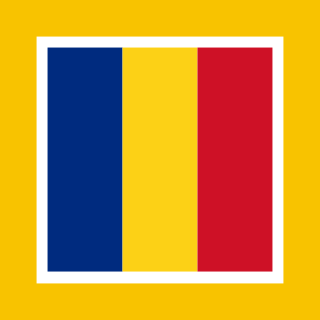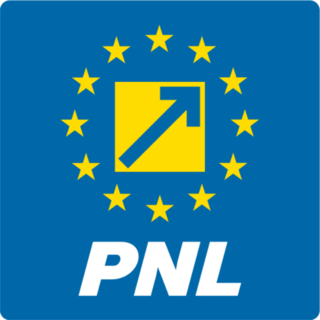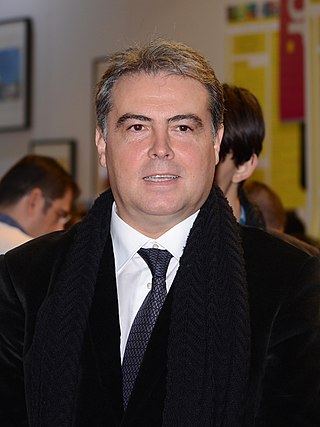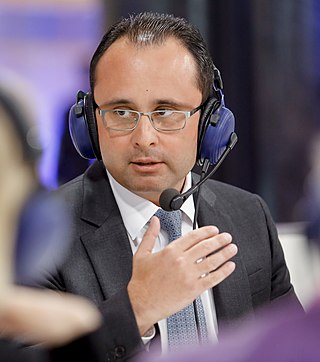| Members of the European Parliament for Romania | |
|---|---|
| Observers | (2005) |
| Delegation | (2007) |
| 6th term | (2007) |
| 7th term | (2009) |
| 8th term | (2014) |
| 9th term | (2019) |
This is a list of the 35 members of the European Parliament for Romania in the 2004 to 2009 session, replacing the members who were appointed by the Romanian Parliament.

Romania's political framework is a semi-presidential representative democratic republic where the Prime Minister is the head of government while the President, according to the constitution, has a more symbolic role, is responsible for the foreign policy, signs certain decrees, approves laws promulgated by the parliament, and nominates the head of state. Romania has a democratic, multi-party system, with legislative power vested in the government and the two chambers of the Parliament, more specifically the Chamber of Deputies and the Senate. The judiciary is independent of the executive and the legislature. From 1948 until 1989, the communist rule political structure took place in the framework of a one-party socialist republic governed by the Romanian Communist Party (PCR) as its only legal party.

The prime minister of Romania, officially the prime minister of the Government of Romania, is the head of the Government of Romania. Initially, the office was styled President of the Council of Ministers, when the term "Government" included more than the Cabinet, and the Cabinet was called the Council of Ministers. The title was officially changed to Prime Minister by the 1965 Constitution of Romania during the communist regime.

The president of Romania is the head of state of Romania. Following a modification to the Romanian Constitution in 2003, the president is directly elected by a two-round system and serves for five years. An individual may serve two terms. During their term in office, the president may not be a formal member of a political party. The president of Romania is the supreme commander of the Romanian Armed Forces.

The National Liberal Party is a liberal-conservative political party in Romania. Re-founded in mid January 1990, shortly after the Revolution of 1989 which culminated in the fall of communism in Romania, it claims the legacy of the major political party of the same name, active between 1875 and 1947 in the Kingdom of Romania. Based on this historical legacy, it often presents itself as the first formally constituted political party in the country and the oldest party from the family of European liberal parties as well.

The Senate is the upper house in the bicameral Parliament of Romania. It has 136 seats, to which members are elected by direct popular vote using party-list proportional representation in 43 electoral districts, to serve four-year terms.

The Chamber of Deputies is the lower house in Romania's bicameral parliament. It has 330 total seats to which deputies are elected by direct popular vote using party-list proportional representation to serve four-year terms. Additionally, the organisation of each national ethnic minority is entitled to a seat in the Chamber.

Romania elects on a national level a head of state – the president – and a legislature. The president is elected for a five-year term by the people. The Romanian Parliament has two chambers. The Chamber of Deputies has currently 330 members, elected for a four-year term by party-list proportional representation on closed lists. The Senate has currently 136 members, elected for a four-year term by party-list proportional representation on closed lists.

The Treaty of Accession 2005 is an agreement between the member states of European Union and Bulgaria and Romania. It entered into force on 1 January 2007. The Treaty arranged accession of Bulgaria and Romania to the EU and amended earlier Treaties of the European Union. As such it is an integral part of the constitutional basis of the European Union.
A parliamentary group, parliamentary caucus or political group is a group consisting of members of different political parties or independent politicians with similar ideologies. Some parliamentary systems allow smaller political parties, who are not numerous enough to form parliamentary groups in their own names, to join with other parties or independent politicians in order to benefit from rights or privileges that are only accorded to formally recognized groups. An electoral alliance, where political parties associate only for elections, is similar to a parliamentary group. A technical group is similar to a parliamentary group but with members of differing ideologies. In contrast, a political faction is a subgroup within a political party and a coalition forms only after elections.

The Parliament of Romania is the national bicameral legislature of Romania, consisting of the Chamber of Deputies and the Senate. It meets at the Palace of the Parliament in Bucharest, the capital of the country.

The Government of Romania forms one half of the executive branch of the government of Romania. It is headed by the Prime Minister of Romania, and consists of the ministries, various subordinate institutions and agencies, and the 42 prefectures. The seat of the Romanian Government is at Victoria Palace in Bucharest.

Adrian Mihai Cioroianu is a Romanian historian, politician, journalist, and essayist. A lecturer for the History Department at the University of Bucharest, he is the author of several books dealing with Romanian history. He is also noted for his contribution as co-author of a high school textbook.

Corina Crețu is a Romanian politician and a former European Commissioner for Cohesion and Reforms. Crețu is a member of the Romanian PRO Romania and Member of the European Parliament. Between June 2014 and October 2014, she served as a Vice-President of the European Parliament.

Romania elected its members of the European Parliament for the first time on 25 November 2007; the election was initially scheduled for 13 May, but the PM postponed it for domestic political reasons. A referendum on a new voting system for national parliamentary elections was held on the same day.

Marian-Jean Marinescu is a Romanian politician and member of PNL, part of the European People's Party–European Democrats. Elected to the Chamber of Deputies for Dolj County, he became a Member of the European Parliament in January 2007, with the accession of Romania to the European Union. He is a Grand Officer of the Order of the Star of Romania. Marian-Jean Marinescu has been vice-president of the PPE Group for two legislatures, chair of the PPE Working Group "Budgets and Structural Policies", coordinator of the PPE working group for the Multiannual Financial Framework 2021–2027, Vice-Coordinator of the Transport and Tourism Commission (TRAN), vice-president of the "Sky and Space" Intergroup, member of the Board of Directors of the European Agency for Global Navigation Satellite Systems (GSA), ambassador and founding member of the Erasmus program for entrepreneurs . In the new legislature 2019 - 2024, Marian-Jean Marinescu continues his activity in the committees of which he was a member previously, namely: member in the Committee on Transport and Tourism (TRAN), alternate member in the Committee on Industry, Research and Energy (ITRE) and an alternate member of the Committee on Budgetary Control (CONT), as well as coordinator of the PPE group for transport policies. A fluent speaker of French and English, Marian-Jean Marinescu has a solid administrative experience at national level, being deputy in the Romanian Parliament, County Councilor - Dolj County Council - Municipal Councilor Local Craiova and Prefect - Dolj County Prefect Institution. During the activity, Marian-Jean Marinescu was twice awarded the MEP of the Year, in the Research - Innovation section, the Personality of the Year Award in the field of aviation, granted by the European Business Aviation Association (EBAA) in 2017, Red Arrow Award 2017 for Europe's Essential Commitment - Future Business Austria Conference. In the 2014 - 2019 legislature Marinescu was ranked the most active Romanian MEP, with a portfolio of 15 reports as principal rapporteur, 20 alternative reports and 5 opinion reports, as well as one of the ones more influential Romanian MEPs, according to VoteWatch's April 2019 ranking.

Romania is a European Parliament constituency for elections in the European Union covering the member state of Romania. It is currently represented by thirty-three Members of the European Parliament.

Cristian Silviu Bușoi is a Romanian physician and politician. A member of the National Liberal Party (PNL), he was a member of the Romanian Chamber of Deputies for Timiș County from 2004 to 2007, and was a Member of the European Parliament from 2007 to 2013, a position he regained in 2014. He currently chairs the European Parliament's Committee on Industry, Research and Energy (ITRE).

Siegfried Mureșan is a Romanian economist and politician, vice-president of the European People's Party (EPP) since November 2019, vice-president of the European People's Party Group in the European Parliament and member of the National Liberal Party (PNL). He was elected as Member of the European Parliament (MEP) from Romania in 2014 and 2019. Previously, he was a member of the People's Movement Party (PMP) between 2014 and 2018 and the Democratic Liberal Party (PDL) before 2014.

Eugen Tomac is a Romanian politician, historian and journalist currently serving as MEP in the European Parliament for Romania since 2019. He is also the President of the People's Movement Party (PMP).

Victor Negrescu is a Romanian politician of the Social Democratic Party. He is a Member of European Parliament and he was Minister Delegate for European Affairs in the government of Romania between 2017 and 2018. Since 2007, he is the president and national coordinator of the Romanian network of PES activists.